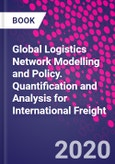Global Logistics Network Modelling and Policy provides guidelines on quality policy, covering investments, management and planning for port and hinterland infrastructure, roads, railways and inland waterway ports. The book first describes the authors' concept and formulation models, followed by a description and analysis of the applied data. As shipping companies fiercely compete in an effort to achieve greater efficiency and impact infrastructure policy and plan for the entire supply chain, they need tactics that drive quality transportation policy and new ways to model and simulate worldwide cargo movements, all while estimating demand and capacity of systems.
This book provides quantitative tools for modeling, analysis, and simulation of worldwide, inter-modal cargo movement - helping forecast the impacts of logistics and related policies in each region of the world. It covers useful applications for every region of the world, allowing policymakers to tailor results for their own specific uses.
Please Note: This is an On Demand product, delivery may take up to 11 working days after payment has been received.
Table of Contents
Part One General introduction 1 Introduction to global container shipping market 2 A global analysis of hinterlands from a European perspective 3 Cross-border logistics practices, policies, and its impact 4 Basics of container demand forecast
Part Two Model & data 5 Basic concept 6 Global maritime container shipping model 7 Intermodal transport super-network model 8 Data [1] maritime shipping and land transport network 9 Data [2] container shipping demand for the present and future
Part Three Application to the developing world 10 Central America: Small countries with active border-crossing transport on land 11 Greater Mekong Subregion: Is the Mekong River shipping competitive with other modes? 12 South Asia: Impact simulations of logistics projects in India, Bangladesh, and Sri Lanka 13 Central Asia: Typical landlocked region across Eurasia continent 14 Pacific Islands: Small and dispersed 'sea-locked' islands 15 Southern Africa: Overcoming corridor and border challenges for landlocked countries 16 Belt and road initiative: How does China's BRI encourage the use of international rail transport across the Eurasian continent?








